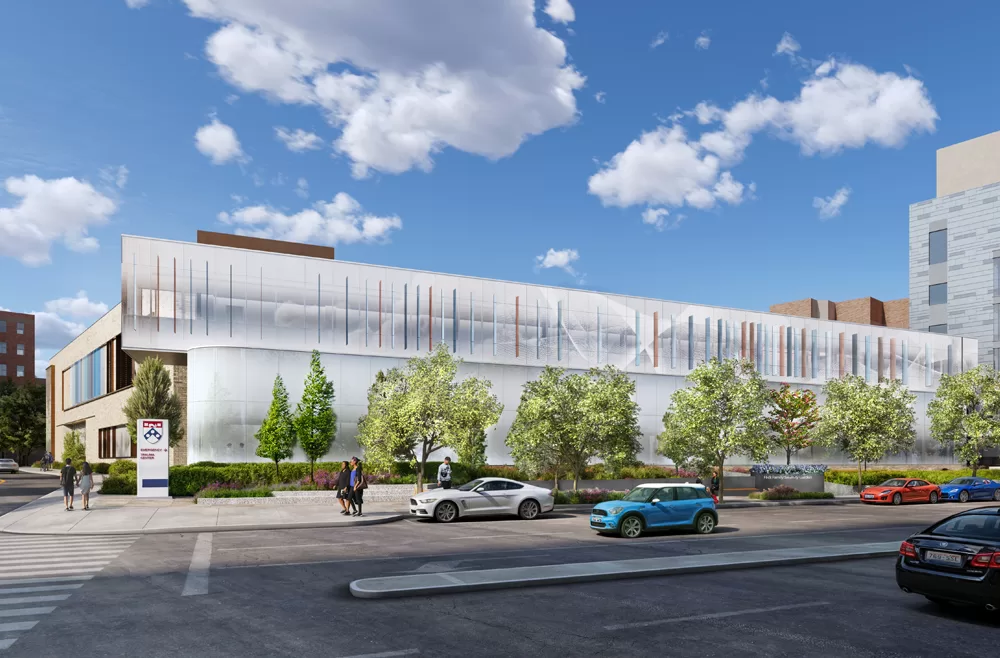Penn Medicine has began construction on a major expansion of its network of cancer treatment facilities: a $224 million Roberts Proton Therapy Center at Penn Presbyterian Medical Center, set to open in late 2027.
The new facility will be Penn Medicine’s fourth proton therapy location, solidifying its place as a world leader in advanced cancer therapy. With a goal of delivering targeted radiation therapy with fewer damages to healthy tissue, proton therapy serves patients by providing fewer side effects and quality of life improvements during and after treatment.
Building on a Global Reputation
The initiative supports Penn’s strategic plan to expand access to advanced therapies via its Abramson Cancer Center, as well as its preparation for a major expansion of its flagship Roberts Proton Therapy Center at the Perelman Center for Advanced Medicine. Since 2010, that first center — the globe’s largest and busiest proton therapy center — has treated close to 11,000 patients, children and adults.
“We’re not just investing in capacity, but in the future of cancer treatment,” said Dr. James Metz, chairman of Radiation Oncology at the Perelman School of Medicine. “Having this new center to open enables smooth care for our patients as we start modernizing our original building.”
The work on the upgrade to proton therapy in the Perelman Center will commence a few months after the Penn Presbyterian location opens.
Read also: Turner Tops Out Massachusetts General Hospital, Building Healthcare for a Changing Climate
Penn Medicine Roberts Proton Therapy Center Expansion: Project Factsheet
Location: Penn Presbyterian Medical Center, University City, Philadelphia
Project Overview:
Construction of a new $224 million Roberts Proton Therapy Center, expanding Penn Medicine’s network of advanced cancer treatment facilities and reinforcing its global leadership in proton therapy.
Expected Opening: Late 2027
Facility Details:
43,000-square-foot expansion extending the Penn Presbyterian campus toward 38th Street
Two Proteus ONE proton therapy systems for high-precision cancer treatment
One TrueBeam photon therapy system (expected operational by fall 2025), doubling photon therapy capacity at Penn Presbyterian
Impact:
Expand access to advanced proton and photon therapy through Penn’s Abramson Cancer Center
Support a seamless transition during future upgrades at the flagship Roberts Proton Therapy Center at the Perelman Center for Advanced Medicine
Advance Penn Medicine’s leadership in cancer treatment, research, and education
Improve patient outcomes through highly targeted therapies that reduce side effects and preserve quality of life
Read also: Children’s Mercy Hospital Kansas Unveils $152M Expansion Plan
What’s Inside the New Center?
The growth will add another 43,000 square feet to Penn Presbyterian, extending the campus footprint toward 38th Street. Two state-of-the-art Proteus®ONE proton therapy machines will be the foundation of the new building, delivering high-precision treatments with less damage to healthy surrounding tissue.
With the proton therapy equipment, the project will have a new treatment room housing a TrueBeam photon therapy system, a standard form of radiation therapy employing high-energy X-rays to kill cancer cells. The new TrueBeam should be operational by fall 2025, effectively doubling Penn Presbyterian’s photon therapy treatment capacity.
Getting Around Campus While Under Construction
In order to accommodate the Penn Medicine’s new proton therapy center construction, Medical Drive is currently closed. Patients and visitors should enter through Filbert Street to parking and the main entrance of the Cupp Building. Penn Medicine will continue to send notifications regarding traffic patterns and directions on the Presbyterian website.
A Broader Vision for Cancer Care
This growth is more than new facilities — it’s one component of Penn Medicine’s broader vision to establish new standards in cancer care, research, and education. By pushing the boundaries of technology today, Penn is rewriting what cancer care will look like tomorrow — for patients here and around the world.
Read also: El Camino Health Breaks Ground on New Rehab Hospital in Sunnyvale

Leave a Reply